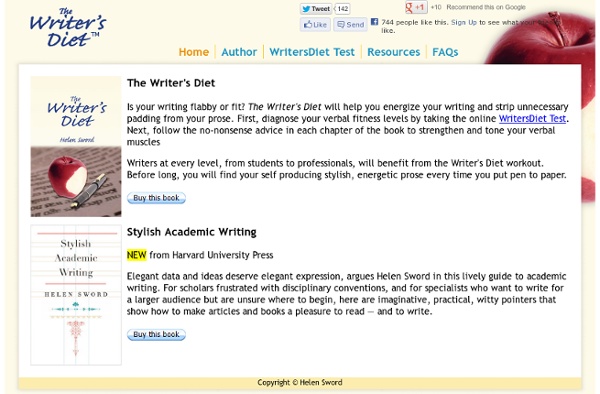



CALLIHOO Writing Idea Generators: The 37 Dramatic Situations The Thirty-six (plus one) Dramatic Situations Georges Polti says that all stories boil down to just 36 dramatic situations and takeoffs of those situations. Somebody else out there added #37. If you're stuck for a situation, try this. A situation appears below randomly (in bold print). Ink - Quotes about writing by writers presented by The Fontayne Group Writing "I put a piece of paper under my pillow, and when I could not sleep I wrote in the dark." Henry David Thoreau "Writing is an adventure." Winston Churchill "Know something, sugar? Stories only happen to people who can tell them." Allan Gurganus "... only he is an emancipated thinker who is not afraid to write foolish things." Anton Chekhov "A poet is someone who stands outside in the rain hoping to be struck by lightening."
How “one weird trick” conquered the Internet: what happens when you click on those omnipresent ads Ad screengrab You’ve seen them. Peeking out from sidebars, jiggling and wiggling for your attention, popping up where you most expect them: those “One Weird Trick” ads. These crudely drawn Web advertisements promise easy tricks to reduce your belly fat, learn a new language, and boost your credit score by 217 points. They seem like obvious scams, but part of me has always wanted to follow the link. One Sentence Stories See also: the most popular from the last 30 days. David Vanderbyl Only a few blocks from home my 3-year-old brother opened the rear door of our family's Dodge Polara, and quick as a wink he was gone. tags: childhood drama [add] 2006-09-02 19:10:06 / Rating: 7330.25 /
Poetry Lines Free Poetry Course from Cupiderosbooks.com Without structure you might as well write some random short sentences, one after another and call it a poem. That is incredibly easy to do. No one may understand your poem, but it is very easy to say those famous two words "I'm finished." Unspeakable Conversations I have agreed to two speaking engagements. In the morning, I talk to 150 undergraduates on selective infanticide. In the evening, it is a convivial discussion, over dinner, of assisted suicide. I am the token cripple with an opposing view. I had several reasons for accepting Singer's invitation, some grounded in my involvement in the disability rights movement, others entirely personal.
Fiction Writing: What Makes Readers Care About Your Characters? “Really scary books succeed because we come to know and care about the characters. I like to say, “It’s the PEOPLE, stupid” — NOT the monsters!” - Stephen King What makes readers care about your characters? What makes them hate with a passion or fall in love? Ten rules for writing fiction Elmore Leonard: Using adverbs is a mortal sin 1 Never open a book with weather. If it's only to create atmosphere, and not a character's reaction to the weather, you don't want to go on too long. The reader is apt to leaf ahead looking for people. There are exceptions. If you happen to be Barry Lopez, who has more ways than an Eskimo to describe ice and snow in his book Arctic Dreams, you can do all the weather reporting you want.